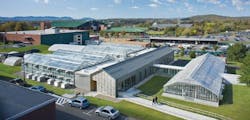Integrated Laboratory and Greenhouse Supports Scientific Research at UMass
The CNS Research and Education Greenhouse at the University of Massachusetts–Amherst is a 20,000-sf complex supporting advanced research in the plant, soil, and insect sciences. It comprises a new 10,000-sf greenhouse, a new 5,000-sf research laboratory, and a renovated 4,500-sf teaching greenhouse. The greenhouses include automated systems to control light, temperature, humidity, and irrigation; sustainable features include a stormwater retention system, an energy recovery system, and an evaporative cooling system. Boston-headquartered architecture firm Payette designed the research and education complex.
[pagebreak]
New children’s hospital in Baltimore built to make patients feel at home
The Herman & Walter Samuelson Children’s Hospital at Sinai in Baltimore is a $29.5 million, 57,200-sf facility designed by local firm Hord Coplan Macht. The hospital focuses on family-centered care, featuring 26 private inpatient rooms with large glass windows to bring in natural light, as well as custom-designed elevator buttons for creating a playful feel. The Building Team also included Whiting-Turner Contracting Co. of Baltimore, consulting engineering firm Leach Wallace Associates, Elkridge, Md., structural engineering firm Morabito Consultants, Sparks, Md., and Baltimore-headquartered civil engineering consultant RK&K.[pagebreak]
Cornell’s College of Human Ecology moves into new sustainable facility
The 89,000-sf Human Ecology Building at Cornell University in Ithaca, N.Y., was built to integrate with the College of Human Ecology’s existing facilities. The project included a three-story academic/laboratory building, a commons linking the new structure to adjacent areas, and a parking garage. The building provides research laboratories, studios for drawing and design, a display gallery, community spaces, and administrative offices. Targeting LEED Platinum certification, sustainable features include automatic ventilation, green roofing, and electric vehicle charging stations. The Building Team consisted of architecture and planning firm Gruzen Samton • IBI Group, of New York City; civil engineers T.G. Miller, P.C., Ithaca, N.Y.; and construction manager LeChase Construction Services LLC, headquartered in Rochester, N.Y.[pagebreak]
Child care center opens for families of federal government employees
Operated by Childrens’ Creative Learning Centers, White Oak Wonders is a new child care facility located on the campus of the U.S. Food and Drug Administration headquarters in White Oak, Md., and serves the families of FDA and other federal employees. The U-shaped, single-story 21,000-sf facility is organized across two wings, with administrative and support spaces located in the center and outdoor play areas placed adjacent to classrooms. White Oak Wonders also incorporates sustainability features such as green roofing and stormwater management systems. Architecture firm RTKL partnered with NTVI Enterprises LLC on design construction, and KlingStubbins Inc. was responsible for civil engineering and project management support.[pagebreak]
Shopping center redevelopment improves pedestrian experience in a suburb of Chicago
Renovations are complete at the 251,313-sf Rice Lake Square in Wheaton, Ill., in the western suburbs of Chicago. Improvements include roof uplighting and tower elements, two pedestrian plazas, more convenient parking spaces, improvements to traffic flow, and landscaping. The expansions took five months to complete, according to Mid-America Asset Management, Oakbrook Terrace, Ill., which oversaw the redevelopment. The Building Team included architect Pappageorge Haymes Partners, civil engineer SPACECO Inc., landscape architect Hitchcock Design Group, and general contractor Pepper Construction; all are based in the Chicago area.[pagebreak]
Day shelter for women in Boston neighborhood receives makeover
The Women’s Lunch Place, a day shelter for homeless women in Boston’s Back Bay neighborhood, was recently renovated to create a warmer, more inviting atmosphere for guests. Architecture and planning firm Arrowstreet, Somerville, Mass., took a 50-year-old basement and exposed its brick piers and granite foundation walls to allow for more natural lighting in the shelter’s dining space. The project added a new industrial kitchen designed to serve 200 meals per day as well as the ability to accommodate shelter-related events. Also renovated were support spaces, including a resource center and reading room located in the upper levels. BD+CSign up for Building Design+Construction Newsletters
